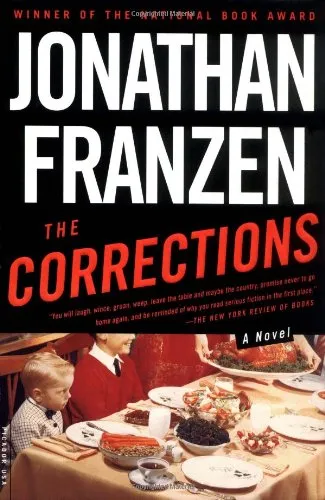The Corrections

by Jonathan Franzen
Farrar Straus & Giroux, 2001
Review by Christian Perring, Ph.D. on Oct 21st 2001
Volume: 5, Number: 42
Underneath this rich and often funny tale of a family is a relentless pessimism. The corrections of the title have a number of meanings. There’s correction in the sense of punishment, as in a department of corrections; the correction of the stock market after it has gone too high; and the correcting of a mistake. The bleak theme of the novel is that we can’t make up for our mistakes, and there’s no salvation or redemption when we go astray and hurt ourselves and those around us.
The parents of the family, Alfred and Enid, live in St. Jude, in the mid-west. Their children, Gary, Denise and Chip, live on the east coast. Franzen tells the story of each family member, one by one. Alfred worked in a railroad company and now has Parkinson’s, Enid is his dutiful wife and is trying to cope, Gary, struggling with depression, is married with children and works in banking, Denise became a chef and has a series of affairs with married people, and Chip went into academia, but has recently lost his job for his involvement with one of his students. Each has his or her own secrets, personal sacrifices, moments of selfishness and cruelty, resentments and failures.
The writing is impressive because it keeps the plot moving fast but also manages to paint interesting characters, giving us a sense of their whole lives. The narrative switches from person to person at crucial points, leaving the reader at cliff hanging moments, which provides strong motivation to read on. With each switch brings a change in style and tone; mostly showing the world through the eyes of the character in focus, although a few asides and comments also suggest that the narrator has some distance from the character. The diversity of settings within the plot also helps to keep the story from becoming stale, ranging as it does over college politics, sea cruises for senior citizens, modern biotechnology, modern family life with small children, depression and psychotropic enhancement, fashionable cuisine in Philadelphia, and civil war in small east European countries.
Franzen’s novel has already received high praise and a nomination for a National Book Award, and rightly so. A little more surprising is its selection as an Oprah book choice. In an interview on NPR’s Fresh Air with Terry Gross, Franzen expressed concern that being an Oprah choice would label his book as being for women, and said he hopes that he will not lose a male readership. Certainly there’s nothing about the book in itself to make it seem a “woman’s book,” whatever that might be. What is so interesting is its breadth, and in particular its interest in the meaning of medication. If you don’t want to know too many details about the book, you should not read on.
Chip takes “Mexican A” which takes away his guilt and worries, and enhances his sexual abilities. Once the effect of the drug wears off, Chip feels alone and ashamed of what he has done. Gary worries that he is depressed, because he is in the middle of marital warfare, and if he admits he is depressed, then all his arguments will be reduced to symptoms, and he will lose all future battles. He scrutinizes each element of his behavior in an attempt to protect himself from a diagnosis of depression, while at the same time seeing everything he does as a potential symptom and result of biochemical imbalances in his brain. Enid goes on a cruise and takes Aslan, a new medication, not approved by the FDA and so not available in the USA, that rids her of shame and worry, and helps her sleep better. When her pill supply runs out, her shame redoubles. Then there’s a new drug being developed, with the wonderful name of Corecktall, that is a potential wonderdrug, with the capability of curing all unwanted symptoms and problematic behavior. Gary is keen to invest in this new drug, while Denise hopes that it will cure their father’s Parkinson’s.
Franzel does not go in for long theoretical discussions of mental disorders and medication, but it’s clear that his attitude is skeptical. Given the theme of the book, and his fondness for sneaking in quotations from Schopenhauer, it’s clear that he is not sympathetic to any possibility of a quick fix to life’s problems or a reduction of human consciousness to chemical interactions in the brain. He writes about these medications with a mixture of seriousness and playfulness, giving the novel an air of a satire of modern life.
In all, this is a highly satisfying novel. It’s thoughtful and clever, but it isn’t pretentious, since Franzel knows the importance of pleasing his readers. It certainly makes him one of the most interesting of contemporary US novelists, and I strongly recommend The Corrections.
© 2001 Christian Perring. First Serial Rights.
We are a health technology company that guides people toward self-understanding and connection. The platform provides reliable resources, accessible services, and nurturing communities. Its purpose is to educate, support, and empower people in their pursuit of well-being.
Further Reading
We are a health technology company that guides people toward self-understanding and connection. The platform provides reliable resources, accessible services, and nurturing communities. Its purpose is to educate, support, and empower people in their pursuit of well-being.